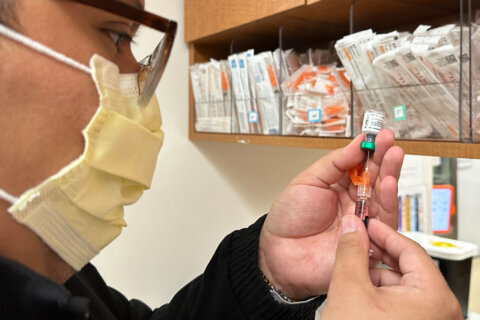May is national Mental Health Awareness Month, and a doctor wants to clear up the stigma around depression and give suggestions on how to support those experiencing it.
About 60% of the people who die by suicide have had a mood disorder, such as major depression — a condition that frequently goes untreated.
“They are reluctant to talk about it or reveal it. They feel stigmatized and often ashamed,” Dr. Mark H. Pollack, chief medical officer for Myriad Neuroscience, said.
People with depression, as well as their friends, family and loved ones, should realize that it’s no one’s fault.
“Depression is not a moral failing or a weakness, but rather a medical condition that their loved one needs help with,” Pollack said.
Pollack suggested way to express support for those experiencing the disease.
“Ask if there’s anything that they can do to help the individual, to listen to them when they’re discussing their distress and struggles and importantly encourage them to seek treatment,” he said.
Depression can cause great suffering to individuals and families — up to and including suicide — about 47,000 people die by suicide in the U.S. each year.
“The cost of untreated depression is high. On the other side of that, treatment is effective. There are a wide range of available, effective treatments,” Pollack said.
When medicine is a recommended option, it might take individuals a few tries to find one that’s effective, appropriate for their specific situation and free from side effects.
The use of genetic information to help guide treatment is an evolving area of medicine referred to as precision or personalized medicine that Pollack, working with the GeneSight test at Myriad Neuroscience, finds exciting.
“The idea [is] that knowing an individual’s genetic predisposition, we have a better chance of finding a medicine that’s going to be best for that given individual,” he said.
Pollack said this type of treatment is increasingly being used on patients with cancer and sometimes patients with cardiac disease.
“And, tests like GeneSight are now being used for patients with mental health issues to try to refine and improve the use of medication that are more likely to help them,” Pollack said.
If you are, or know someone who’s having thoughts about hurting themselves or suicide, the Centers for Disease Control and Prevention recommends you seek help immediately:
- Call 1−800−273−TALK (8255) to reach a 24−hour crisis center or dial 911.
- The National Suicide Prevention Lifeline at 800−273−TALK provides free‚ confidential help. It’s run by the Substance Abuse and Mental Health Services Administration.
- Call your mental health provider.
- Get help from your primary doctor or other health care provider.
- Reach out to a close friend or loved one.
- Contact a minister, spiritual leader or someone else in your faith community.
Pollack said the process of seeking help for depression can be frustrating but people shouldn’t get discouraged. Getting into and sticking with treatment that might include medicine or different kinds of therapies can help.
“The vast majority of those people are going to end up doing much better in getting their lives back,” he said.








